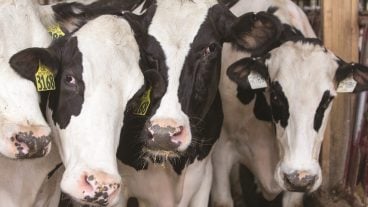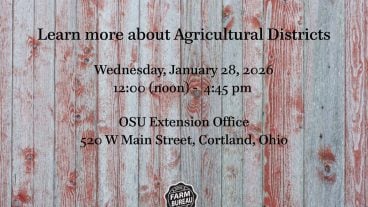Embrace the family legacy
We often talk about the moments that shape us — big decisions, career paths and life milestones. But more often than not, it’s not the moments that define us. It’s the people.
Read MoreA gardening Q & A related to planting date, fertilizer recommendations and other general gardening questions.
Hello, everyone and welcome to spring!
We’re all gearing up for the gardening and planting season, and I’ve started to get some questions related to planting date, fertilizer recommendations and other general gardening questions.
Planting date. The planting date will depend on the crop you intend to plant. Soil temperature, day length and other environmental factors will determine when you should plant. You don’t have to be a meteorologist, astrologer or go by the phases of the moon – just read the seed packet. Seed companies provide this information to take the guesswork out of when you should plant. Peas, for example, enjoy colder temperatures and can be planted when soil temperatures are above 40 degrees, but if you plant cucumbers in cold soil you will regret it. Many seed packets will say to plant after the risk of frost has passed, and in Trumbull County, our average last frost-free day is May 15. Planting after this date will avoid frost most years.
Fertilizer and soil fertility. You should soil test to get the most accurate pH, phosphorus and potassium recommendations for your garden. There simply is no substitute for a good soil test. You’ve probably seen the soil pH testers in the garden centers, but I can assure that they are not accurate. Even if you use the pH paper, that will only provide you a reference of the soil pH and not provide any measure of how much lime (or sulfur) to add to get to the correct level. I see hundreds of soil tests each year and the misapplication of lime is by far the most common mistake I see. You can purchase soil testing kits through our office or from many garden centers in the area. I’ve seen some soil testing kits sold in box stores, but if you’re paying over $20 for a soil test, you’re paying too much unless you are testing for everything. If you need help interpreting a soil test, I can help, and it does not matter where you purchased the test kit.
Nitrogen is highly variable in the soil as it moves with water, or volatilizes into the atmosphere. This makes it notoriously hard to measure, current available levels in the soil are not typically provided on soil test results. Nitrogen does not typically stick around from year to year, so it should be applied yearly. Rates will vary depending on the crop, but 100 to 130 pounds of actual nitrogen per acre will be needed for most common crops. Be careful though, if you over apply nitrogen to some crops like tomatoes, you will have the biggest, greenest, bushiest plants you have ever grown, but no fruit. On a side note, you can apply one to four pounds of actual nitrogen (not fertilizer) per 1,000 square feet to your lawn to green it up all year. You can split apply (spring, summer, fall) this amount to provide a green lawn all year.
Manure. I frequently get asked about my thoughts on using manure in the garden. Manure is a great, and usually cheap way to apply nutrients and organic matter to your garden. Not all manure is created equal though. Horse manure should be avoided, as it has very low nutrient levels, so low that the organisms that break down the manure typically need more nitrogen to work effectively. If you apply this manure to your garden, those microbes will pull nitrogen from your soil to break down the manure, in effect reducing nutrients available to your plants. On top of that, the horse digestion system does not adequately digest weed seeds so they remain viable in the manure.
In summary, if you use horse manure you are likely tying up nutrients in your soil and spreading weed seeds – not a good combination. Other manures from cows, sheep, rabbits and chickens are better options. Be sure to keep fresh manure away from produce to prevent contamination. The last thing you want is to have little bits of cow poop splashing up on your ripe tomatoes when it rains.
Good luck this gardening season, and reach out to our office at 330-638-6783 with any gardening questions you may have.
Submitted by Lee Beers, an Agriculture & Natural Resources Educator for OSU Extension-Trumbull County. He can be reached at 330-638-6738 or by email.
OFBF Mission: Working together for Ohio farmers to advance agriculture and strengthen our communities.


We often talk about the moments that shape us — big decisions, career paths and life milestones. But more often than not, it’s not the moments that define us. It’s the people.
Read More

The purpose of this $1,500 grant is to help offset farm operation costs. This can include but is not limited to: fuel costs, fertilizer costs, equipment costs, land rent, etc.
Read More

I’m going to give you a list of things that you can do that will get you outside and actually enjoy the snow.
Read More

As kids, we are often told to try new things, whether it be a new food, a new activity or…
Read More

Learn more about ag districts from noon to 4:45 p.m. Jan. 28 at the OSU Extension Office, 520 W. Main Street in Cortland.
Read More

We aren’t just reacting to change — we’re shaping the future of agriculture, one conversation and one decision at a time, together.
Read More

Today, there are close to 15,000 farms growing Christmas trees in the U.S., and over 100,000 people are employed full- or part-time in the industry.
Read More

In a world that can sometimes be so loud and busy, snow literally slows us down and quiets the sound.
Read More

It might seem like a real chore to have to take care of the animals before any Christmas gifts or meals can happen, but to me it is such a special time.
Read More

Happy Thanksgiving, Everyone! I say it every year, but Thanksgiving is my favorite holiday. The gathering of friends and family…
Read More